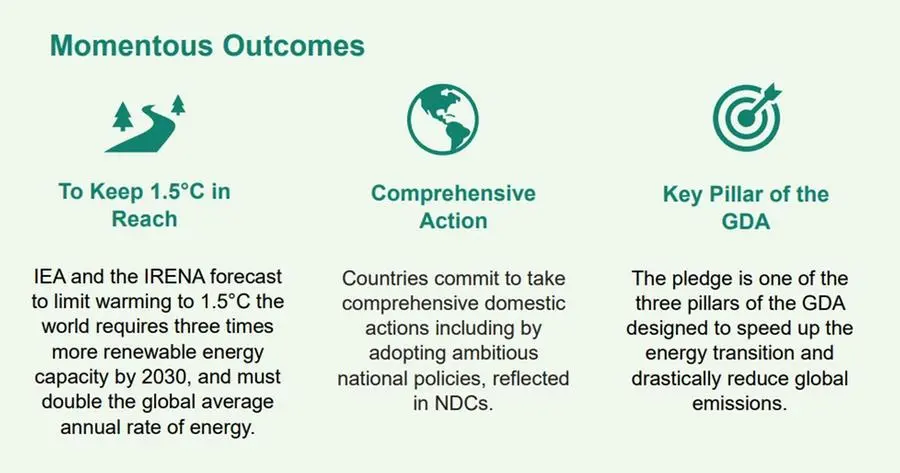Dubai: At the World Climate Action Summit today, COP28 President Dr. Sultan Al Jaber unveiled the Global Decarbonization Accelerator (GDA), a series of landmark initiatives designed to speed up the energy transition and drastically reduce global emissions.
The GDA is focused on three key pillars: rapidly scaling the energy system of tomorrow; decarbonizing the energy system of today; and targeting methane and other non-CO2 greenhouse gases (GHGs). It is a comprehensive plan for system wide change, addressing the demand and the supply of energy at the same time. The GDA has been informed by the thinking of key stakeholders, including the international organisations, governments and policy makers, NGOs, and CEOs from every industrial sector.
Commentating on the launch of the GDA, Dr. Al Jaber said: “The world does not work without energy. Yet the world will break down if we do not fix energies we use today, mitigate their emissions at a gigaton scale, and rapidly transition to zero carbon alternatives. That is why the COP28 Presidency has launched the Global Decarbonization Accelerator.”
How will countries do this?
Before Paris, 186 countries submitted carbon reduction targets (known as “intended nationally determined contributions,” or INDCs), which outlined how each country would cut its carbon emissions. Once those countries joined the Paris Agreement, those INDCs became NDCs (nationally determined contributions). There is no one-size-fits-all approach for the NDCs, and different countries are taking climate action in different ways, from investing in renewable energy to introducing carbon taxes. The NDCs are to be updated every five years by Parties to the Agreement, and each new iteration is expected be more ambitious than the previous one.
english_paris_agreementDownload
https://www.youtube.com/embed/UTt_iW0h7LQ?feature=oembed
The global stocktake is a critical turning point when it comes to efforts to address climate change in all Countries and Kenya – it’s a moment to take a long, hard look at the state of our planet and chart a better course for the future. Decision 19/CMA.1 notes that the global stocktake “will be a Party-driven process conducted in a transparent manner and with the participation of non-Party stakeholders” (para. 10), it enables countries and other stakeholders to see where they’re collectively making progress toward meeting the goals of the Paris Agreement – and where they’re not. It’s like taking inventory. It means looking at everything related to where the world stands on climate action and support, identifying the gaps, and working together to agree on solutions pathways (to 2030 and beyond).
Some key COP28 Agreements:
Accelerators – Energy Transition
IPCC report – AR6 Synthesis Report Climate Change 2023
UNEP – Global Goal on Adaption
UNDP – Just Transition Pathway
Just-Transition-Issue-BriefDownload
Rapidly scaling the energy system of tomorrow
Today 116 countries have signed the Global Renewables and Energy Efficiency Pledge as of today, agreeing to triple worldwide installed renewable energy generation capacity to at least 11,000 gigawatts and to double the global average annual rate of energy efficiency improvements from around 2 percent to more than 4 percent ever year until 2030.

Through the UAE Hydrogen Declaration of Intent, 27 countries have agreed to endorse a global certification standard and to recognize existing certification schemes, helping to unlock global trade in low-carbon hydrogen.
Decarbonizing the energy system of today
Under the GDA, 50 companies, representing over 40 percent of global oil production have signed on to the Oil and Gas Decarbonization Charter (OGDC), committing to zero methane emissions and ending routine flaring by 2030, and to total net-zero operations by 2050 at the latest. Over 29 National Oil Companies (NOCs) have committed to the Charter – the largest ever number of NOCs to sign up to a decarbonization pledge. The OGDC is an important step towards the industry increasing actions aligned with the aims of the Paris Agreement.
Signatories to the Charter agree to target a number of key actions, including:
- Investing in the energy system of the future including renewables, low-carbon fuels and negative emissions technologies.
- Increasing transparency, including enhancing measurement, monitoring, reporting and independent verification of GHG emissions and their performance and progress in reducing emissions.
- Increasing alignment with broader industry best practices to accelerate decarbonization of operations and aspire to implement current best practices by 2030 to collectively reduce emission intensity.
- Reducing energy poverty and providing secure and affordable energy to support the development of all economies.

The GDA also includes the launch of the Industrial Transition Accelerator (ITA), which will accelerate decarbonization across key heavy-emitting sectors, and encourage policymakers, technical experts and financial backers to work hand-in-hand with industries to unlock investment and rapidly scale the implementation and delivery of emissions-reduction projects. Under the leadership of the COP28 Presidency, UNFCCC, and Bloomberg Philanthropies, the ITA Secretariat will be hosted by the Mission Possible Partnership (MPP).
Methane and other non-CO2 greenhouse gases
The third pillar of the GDA will addresses methane and other non-CO2 greenhouse gases through economy-wide methane-emission reduction. In support of this more than $1 billion will be mobilized for methane abatement projects, with additional information to be released on 5 December at the COP28 Energy Thematic Day.
The GDA also covers the Global Cooling Pledge, which targets substantially reducing global cooling emissions by 68 percent by 2050. Such emissions account for seven percent of the global total, a figure expected to triple as more nations adopt air-conditioning. As of today,52 countries have signed the Pledge.
Dr. Al Jaber said, “The GDA represents an inflection point for addressing various challenges that to date have slowed down the energy transition. Each initiative is underpinned by ongoing accountability frameworks to ensure that the commitments made, are commitments delivered.”
In his closing remarks, Dr. Al Jaber was optimistic, stating, “The GDA adds up to more countries and more companies from more sectors than ever before, all aligning with our North Star of 1.5C”.
About the Global Decarbonization Accelerator
Signatories to Oil and Gas Decarbonization Charter
NOCs: ADNOC, Bapco Energies, Ecopetrol, EGAS, Equinor, GOGC, INPEX Corporation, KazMunaiGas, Mari Petroleum, Namcor, National Oil Company of Libya, Nilepet, NNPC, OGDC, OMV, ONGC, Pakistan Petroleum Limited (PPL), Pertamina, Petoro, Petrobras, Petroleum Development Oman, Petronas, PTTEP, Saudi Aramco, SNOC, SOCAR, Sonangol, Uzbekneftegaz, ZhenHua Oil, YPF.
IOCs: Azule Energy, BP, Cepsa, COSMO Energy, Crescent Petroleum, Dolphin Energy Limited, Energean Oil & Gas, Eni, EQT Corporation, Exxonmobil, ITOCHU, LUKOIL, Mitsui & Co, Oando plc, Occidental Petroleum, Puma Energy (Trafigura), Repsol, Shell, TotalEnergies, Woodside Energy Group.
About COP28 UAE:
- Additional information about mobilizing funding for methane abatement
- COP28 UAE will take place at Expo City Dubai from November 30-December 12, 2023. The Conference is expected to convene over 70,000 participants, including heads of state, government officials, international industry leaders, private sector representatives, academics, experts, youth, and non-state actors.
- As mandated by the Paris Climate Agreement, COP28 UAE will deliver the first ever Global Stocktake – a comprehensive evaluation of progress against climate goals.
- The UAE will lead a process for all parties to agree upon a clear roadmap to accelerate progress through a pragmatic global energy transition and a “leave no one behind” approach to inclusive climate action.
COP28 considerations are important for the Lapsset Corridor

